Meghanlata Gupta, Founder of Indigenizing the News
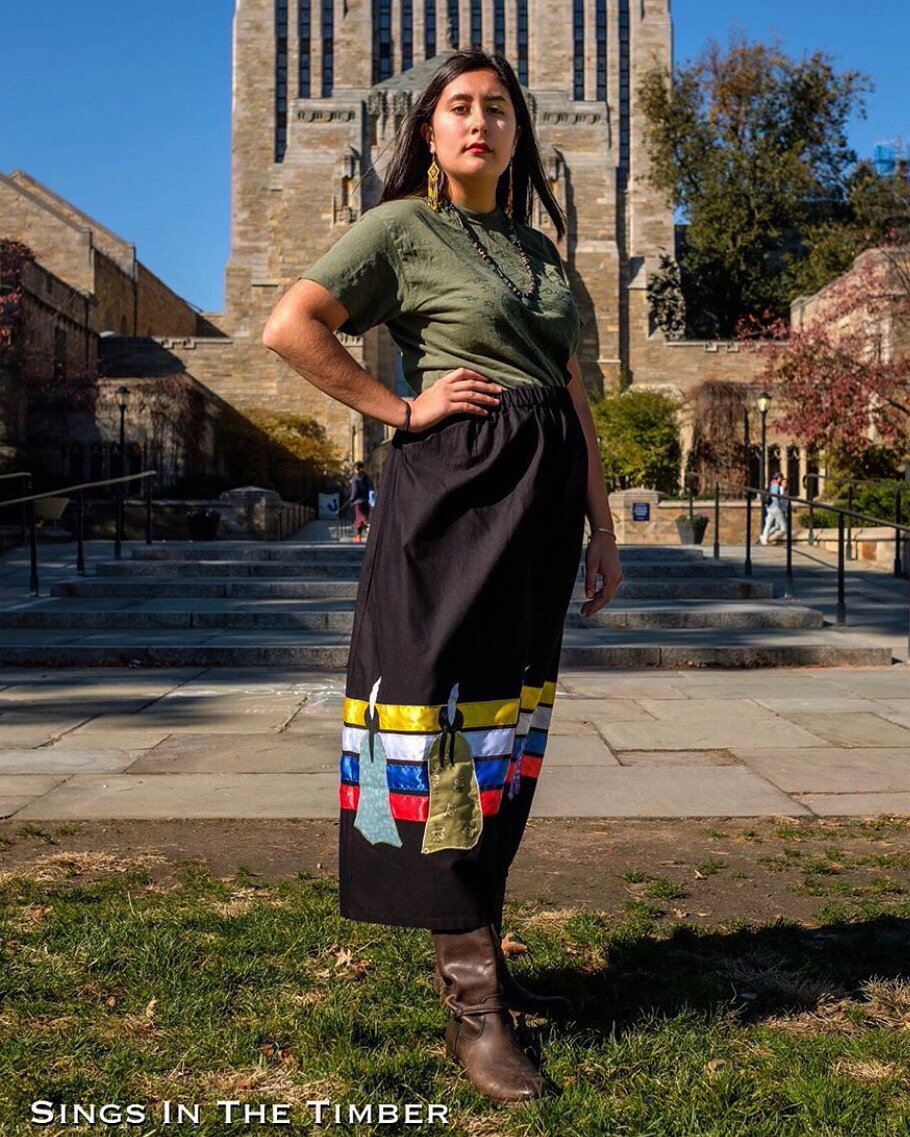
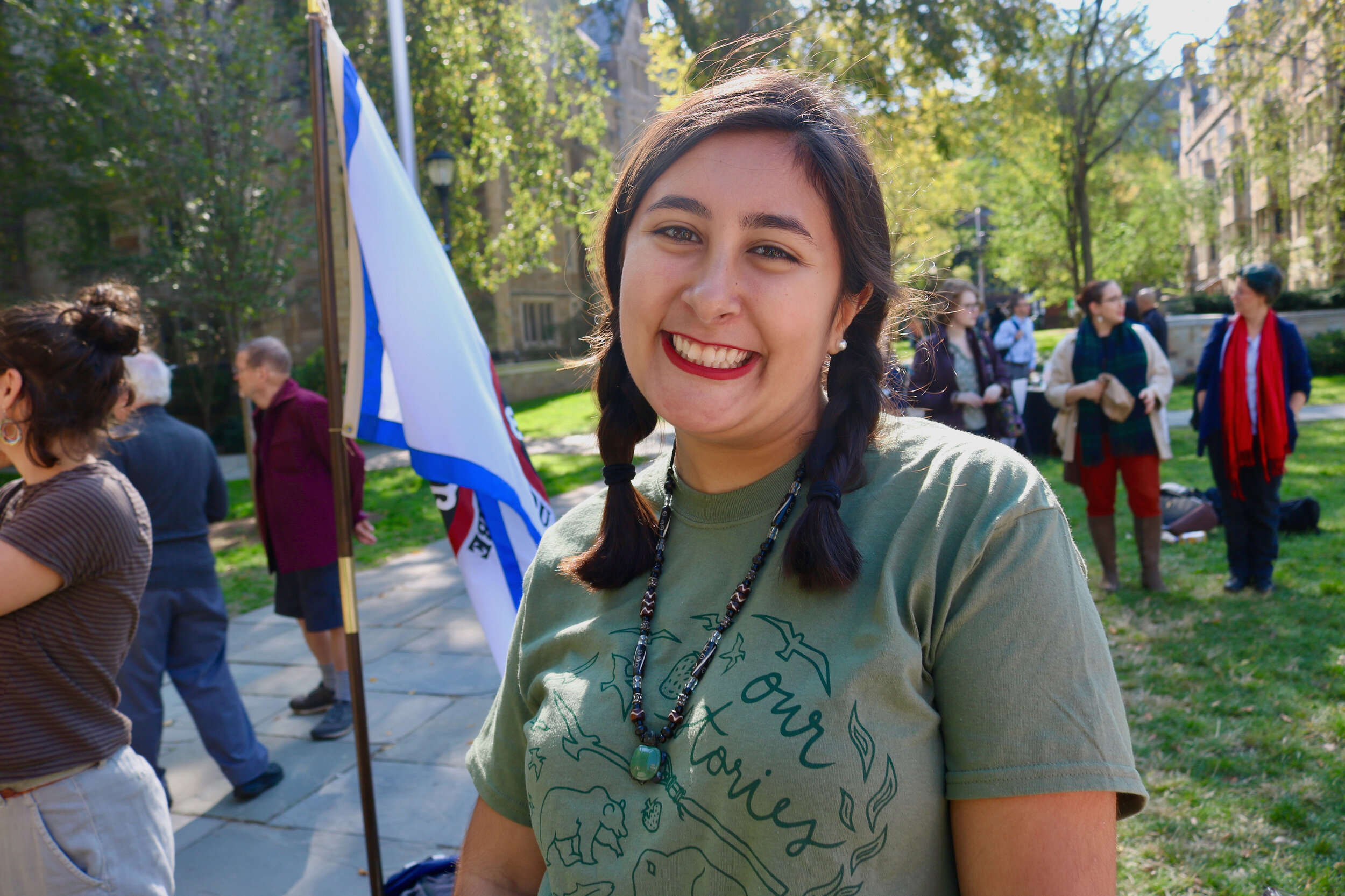
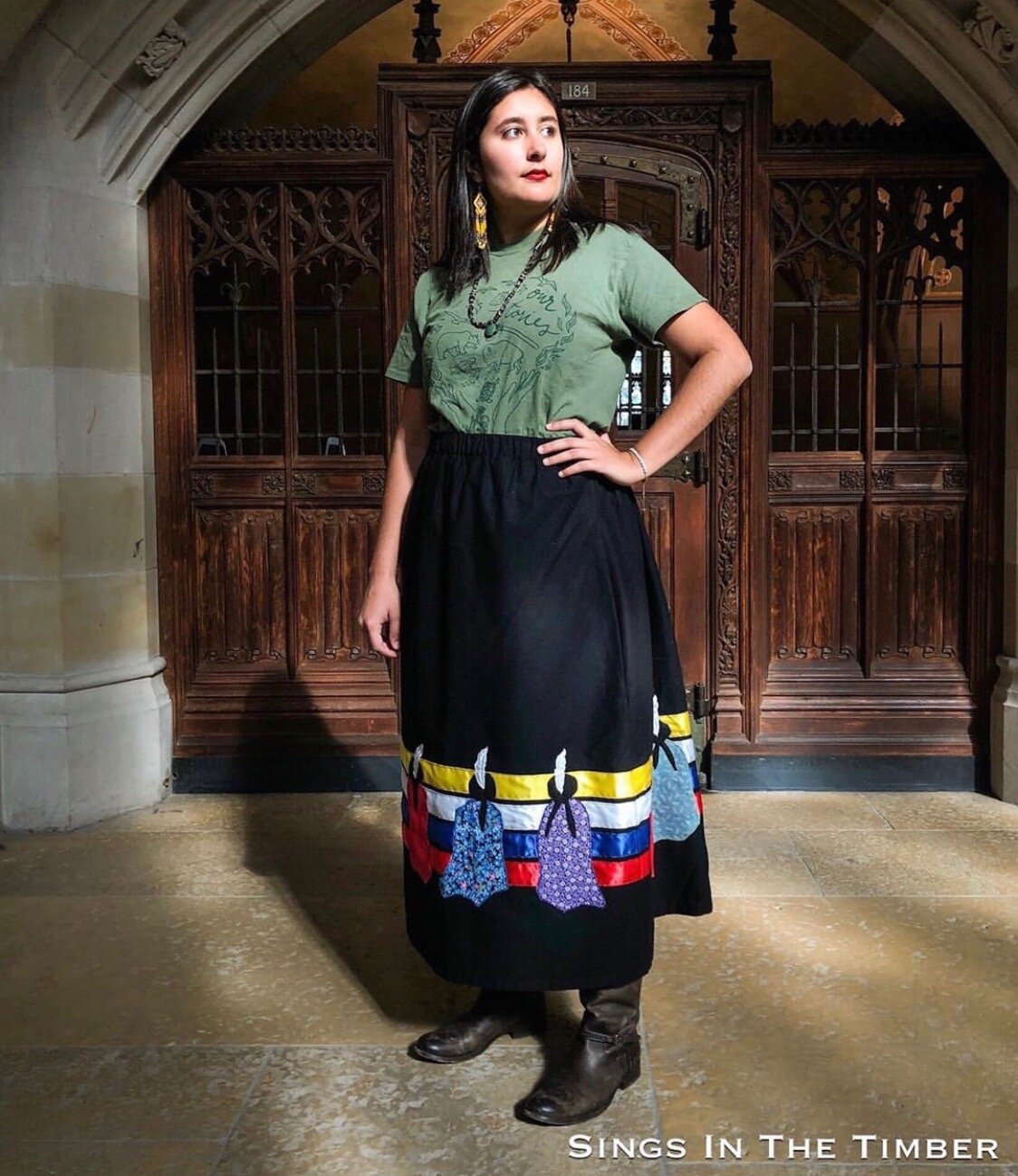
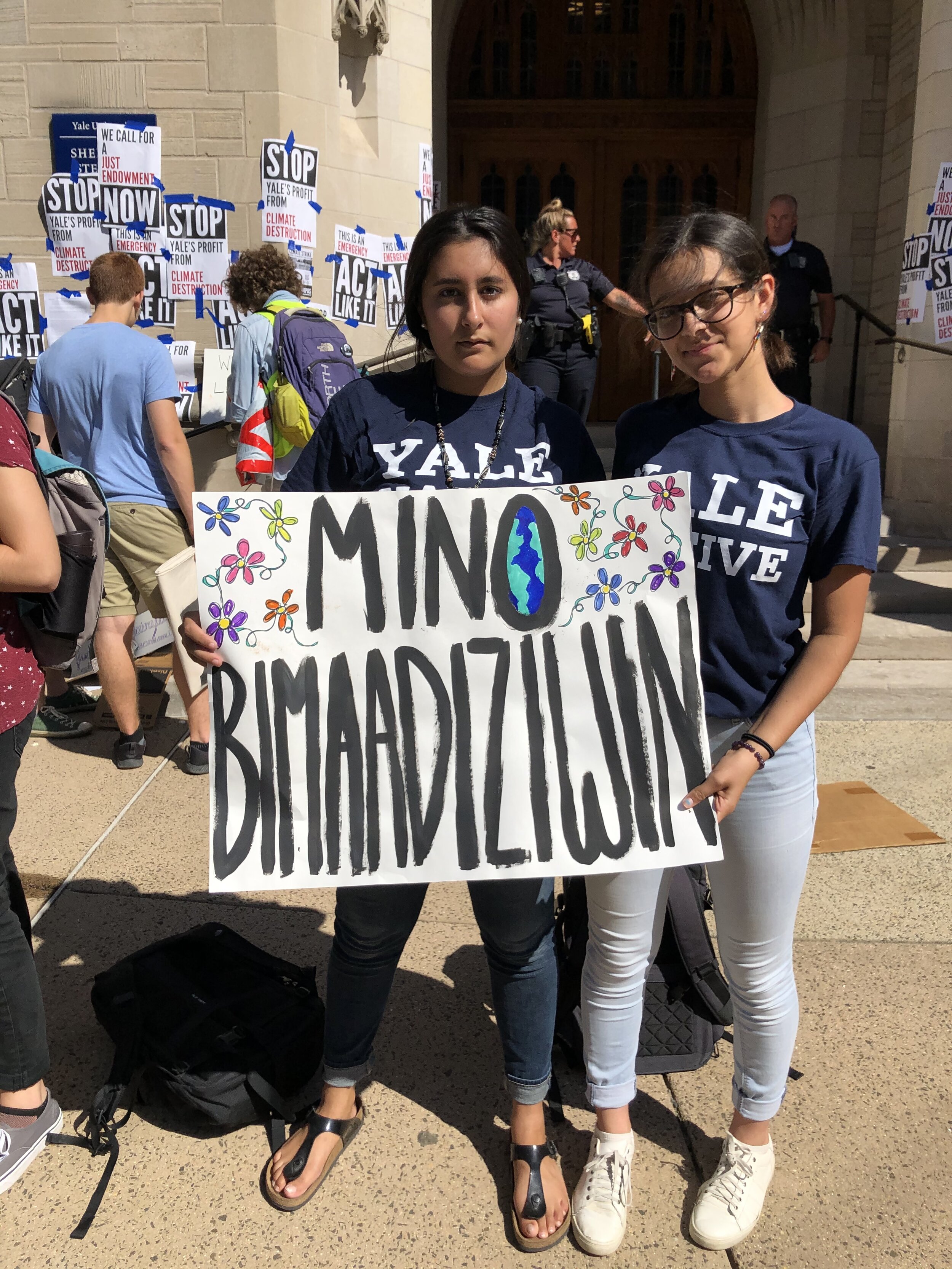
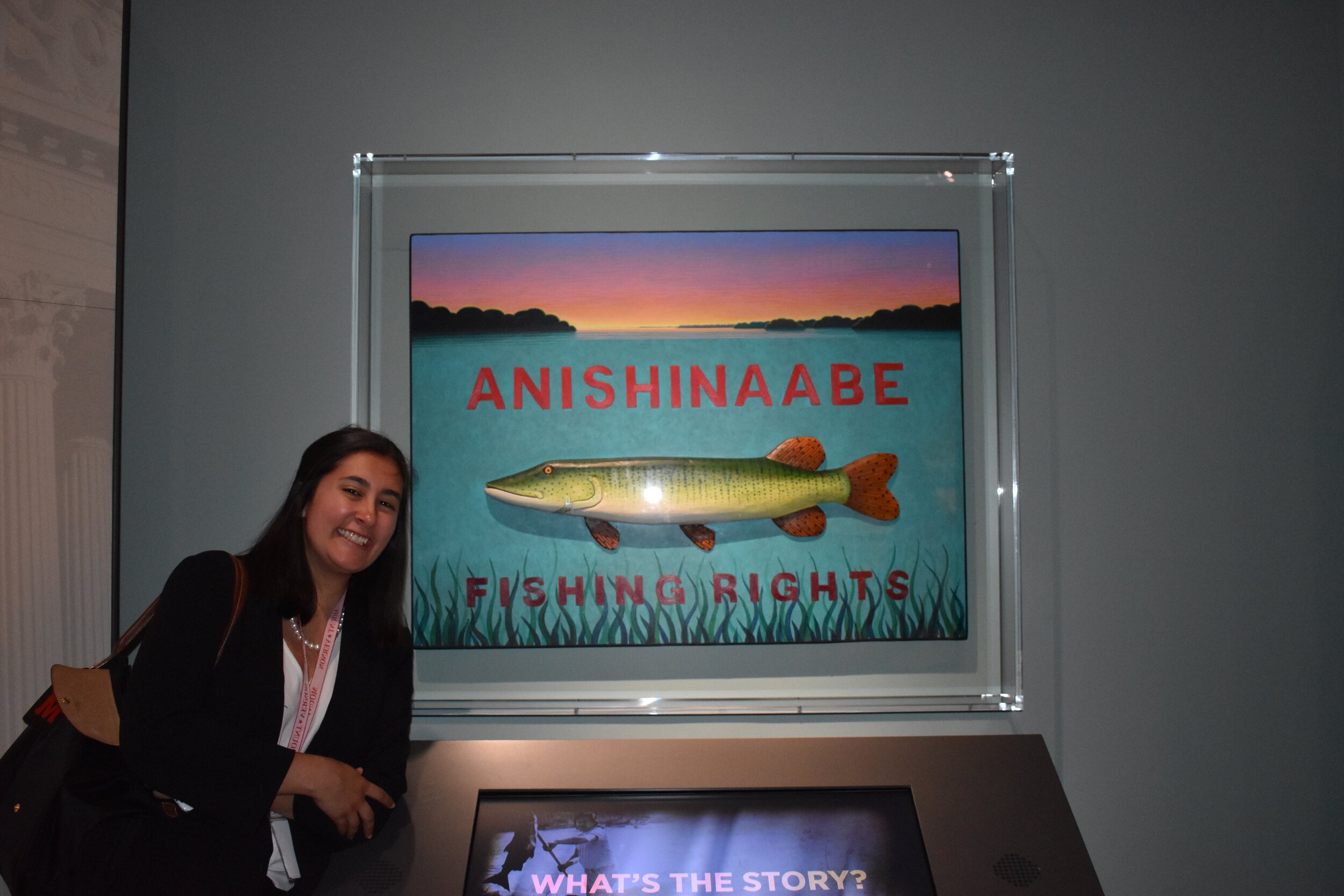
Growing up, my family moved around a lot. My dad immigrated to the United States from India to continue his medical education, but his visa only guaranteed temporary residence. When my parents met and decided to start a family together, we moved across the country while my dad searched for a job that would allow him to stay in the United States—from Michigan to Wyoming and Colorado to Massachusetts to Michigan again, where my family lives now. During these many moves throughout my childhood, I was fortunate enough to engage with so many different, amazing people that I still keep in touch with today.
No matter where we’re living at the time, my family spends every summer in the Upper Peninsula of Michigan, attending summer powwows and other events with friends and family in our tribal community. I’m Ojibwe from the Sault Ste. Marie Tribe of Chippewa Indians, and I come from a long line of strong, loud, and passionate Ojibwe women. When I think about the opportunities I have to learn my language and practice other cultural traditions, I know that it’s all due to the hard work and sacrifices of the women in my family who came before me—my mother, my grandmother, my great-aunt, and many more. In the end, the relationships I cultivate with my family and the communities I belong to are the most important aspects of my life.
My parents have always made education a priority for me and my two sisters. When I started applying to out-of-state colleges, I was worried about being so far away from my family, but they encouraged me to pursue the best, most-challenging learning experiences I could find. I fell in love with Yale because of the incredible student community. My peers teach me new things every day and constantly inspire me to continue the fight for meaningful justice and equity. At Yale, I work at the Native American Cultural Center and sit on the board of the Association of Native Americans at Yale. My current project is Indigenizing the News, a curated news source that I developed to highlight Native voices, news, and contemporary issues. Along with ITN, my academic research at Yale focuses on the intersections between education, Indigenous studies, and collective memory.
Over the summer, I participated in a fellowship program in which every fellow was required to produce a capstone project connected to their academic and career interests. Originally, I wanted to something related to federal Indian law or policy. As I started my research, however, I began to understand that law and policy are ineffective as long as the general public remains uninformed about Indigenous peoples and cultures. The huge lack of education in these topics—Indigenous histories, cultures, communities, and current issues—allows for the violent methods of oppression and erasure against Indigenous peoples to continue.
Indigenizing the News
Indigenizing the News (www.indigenizingthenews.com) came out of this realization—that education is the strongest way to bring societal change, and that an education in Native nations, histories, and contemporary lives is important for everyone. ITN has four objectives: sharing articles about Native and other Indigenous peoples, publishing pieces by Indigenous peoples and their allies, deconstructing and redefining problematic terms and narratives, and providing resources for educators and allies. I want ITN to be a platform for Indigenous peoples to share their news and learn about other Indigenous communities, and I also want it to be a space for non-Indigenous allies to educate themselves and critically evaluate their relationship to Indigenous peoples and communities.
“ITN has four objectives: sharing articles about Native and other Indigenous peoples, publishing pieces by Indigenous peoples and their allies, deconstructing and redefining problematic terms and narratives, and providing resources for educators and allies.”
I spent a lot of time reflecting on the structure of the news source: Who will write for it? Who are we writing for? The “burden to educate” is often placed on Indigenous peoples—we have to constantly inform our peers about our existence, our cultures, and our current struggles for justice. I created Indigenizing the News on the basis that Indigenous education and survivance is a collective process among Indigenous peoples andour allies. Along with Indigenous writers, non-Indigenous allies are doing the work to research and raise awareness of Indigenous issues for articles in ITN. The ITN team is currently recruiting both Indigenous writers and allies to contribute in any way—this could be a book review, news article, reflection, or anything else! To subscribe to ITN, see past issues, or submit a pitch to write, visit www.indigenizingthenews.com.
Famous Pawnee advocate and lawyer Walter Echo-Hawk once said: “The complete lack of representation in the media, in pop culture, in K-12 education not only erases us from the American consciousness, it inadvertently creates a bias. People were less likely to support certain rights and social justice issues for Native people when they had zero perception and understanding of who we are. Invisibility and erasure is the modern form of racism against Native people."
As Echo-Hawk says, the majority of people are completely uninformed about Indigenous peoples and our current issues, and this leads to the propagation of harmful stereotypes and narratives about us. Right now, mainstream media sources is failing in its responsibility to Indigenous communities—they hardly cover Native news, and when they do, the stories are largely damage-centered and work off of these harmful stereotypes and narratives.
Despite this, I am constantly inspired by the many organizations working to further Indigenous representation through journalism and other types of media. Indian Country Today, Native News Online, the Native American Journalist Association, and numerous other groups are working to meaningfully cover Native news and voices from across North America. These organizations and the individuals working in them motivate my own work with Indigenizing the News. By sharing Native-focused news and destroying racist narratives, the news source aims to represent the contemporary strength and large diversity of Indigenous nations and peoples. In this way, ITN has become a form of community organizing and resistance—writers and artists from all over coming together to share our stories and fight back against the colonial institutions that wish to silence us.
“ITN has become a form of community organizing and resistance—writers and artists from all over coming together to share our stories and fight back against the colonial institutions that wish to silence us.”
Finding time to balance my professional pursuits with school work and extracurriculars is definitely hard, and I’m still figuring it out. Since the summer, I’ve definitely been feeling like my life is a constant balancing act between my responsibilities as a student and my work with Indigenizing the News, my research, and other extracurriculars. I absolutely love doing the things that I do, but it can definitely be tiring as well. One of the biggest things I’ve learned along the way is that it is always okay to ask for help! For me, it can sometimes feel daunting (or even embarrassing) to ask for help or to admit when I’m having a bad day, but in the past few months, I have often reached out to family and friends to get advice or just for a shoulder to cry on—doing so has been rejuvenating, and it reminds me that I’m doing the work I do for people that I love and care about so much. Don’t be afraid to seek this love and care from your community! Don’t be afraid to ask for help when you need it!
Another piece of advice that I received this summer from someone older than me is that it’s also okay to say no to things that are too time consuming or emotionally exhausting. As someone who loves to be involved with everything I can, it’s hard for me to say no to people or extracurricular obligations. However, there is so much power in saying no to things that are detrimental to our health! In college, you have the freedom to do what you want and to not do what you don’t want. Take advantage of that! Make time to work hard and do things that you love, but also prioritize yourself when you need to!
self-care
My personal stake in these issues (the climate emergency, MMIW, and Indigenous rights more broadly) is what makes me so passionate, but at the same time, it’s what makes it so emotionally painful. It’s so necessary to take care of ourselves in the midst of organizing, extracurriculars, and classes. Even further, it’s so necessary to think about self-care in the context of community care as well. When I’m feeling down, I know that I can rely on my community of family and friends to pick me back up—and when I’m feeling energized, I want to be a source of support and love for members of the community who are feeling the opposite. As I said before, relationships are the most important aspects of my life. I take care of myself by talking to my mom every day, bonding with people over cooking and eating food, spending quality time with my friends, and watching tv shows. Honestly, doing anything with people I love makes me feel happy and rested. I also love to take walks, even in the wintertime! Getting out for a few minutes every day to move my body is always invigorating. Everyone has different ways of practicing self and community care, but because we all have such personal ties to our work, it’s so important to recognize when we need some time and space to rest and reflect. Remember: it’s okay to ask for help, love, and care!
——@meghanlata, as told to Changing Womxn Collective. interviews have been condensed and edited for clarity.


